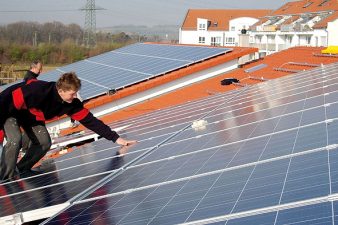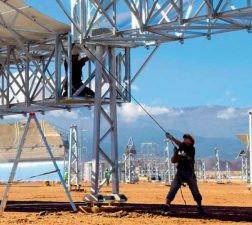 The UAE relocates the residents of Braka in order to build four nuclear power plants.
The UAE relocates the residents of Braka in order to build four nuclear power plants.
As the shovel hits the sand in the remote (former) village of Braka, the site of the United Arab Emirates future nuclear power plants, many argue that using solar power would not only be safer and more environmentally friendly, but also cheaper. The residents of Braka, a village described as a row of shacks on a white untouched beach, have been relocated to other parts of the kingdom after it was chosen due to its remote location far away from the population centers to host four nuclear reactors. When completed in 2020, these will produce 5,600 MW, or a quarter of the country’s electricity demands.
Let the sun shine
According to an article by the Land Art Generator Initiative, Abu Dhabi should have opted for Concentrated Solar Power (CSP) instead, even if it is more expensive at $4.200 per KW hour compared to $3,642.
The price of solar power might be 15% higher then the price of nuclear energy, but in the long run, considering maintenance and insurance costs over the 60 year life span of nuclear plants, as well as factors such as storage of spent fuel and decommissioning at the accumulated cost of $20 billion, solar generated electricity would have been cheaper and environmentally friendlier.
For example, the daily maintenance costs of a concentrated solar power station are estimated to be $200,000 compared to the $900,000 for nuclear plants. This is based on the 60 year lifespan of nuclear plants, while solar plants could last many more years, according to the article, adding up to almost $15 billion saved.
People also tend to have fewer objections to living near solar stations than nuclear power plants, which means they could be placed closer to residential areas and less electricity would be lost during transport.
Keeping up with consumption
The Emirates take great pride in the extensive international cooperation that occurred in preparation of its nuclear project to ensure that it lives up to its vision as a peaceful civilian nuclear program, unlike Iran’s alleged nuclear weapons program just across the Gulf.
While the UAE controls the world’s seventh largest oil reserves and ranks number four in production, this has not been enough to keep up with
rising demands of an ever-growing population and industry, making black outs a common feature during summer.
Photo by jeffpearce and story via Land Art Generator
More on the UAE from Green Prophet:
Growing Green Ethic amongst Emirati Businesses
Public Transportation Takes Flight In Dubai
Solar Power To The People Of Abu Dhabi
Comments
comments
 The UAE relocates the residents of Braka in order to build four nuclear power plants.
The UAE relocates the residents of Braka in order to build four nuclear power plants. 

